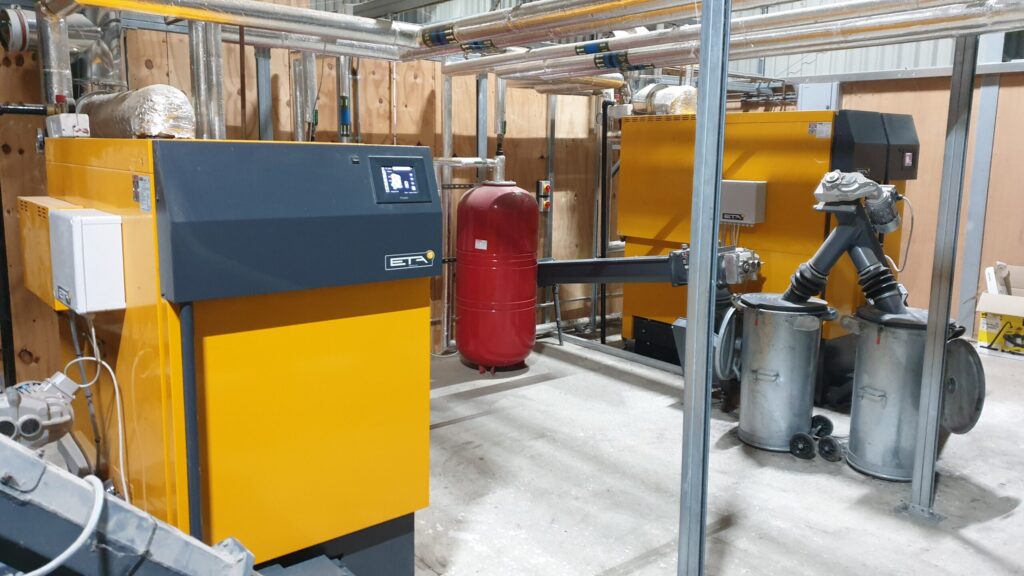When it comes to heating our homes, we are constantly searching for more sustainable and eco-friendly options. One such option is biomass fuel, which is derived from organic materials such as wood pellets, agricultural waste, and even dedicated energy crops. Biomass boilers, on the other hand, are the heating systems that burn these biomass fuels to generate heat and hot water for your home. In this comprehensive guide, I will walk you through everything you need to know about choosing the perfect biomass fuel and biomass boiler for your home.
Types of Biomass Fuel and Their Characteristics
There are various types of biomass fuel available, each with its own unique characteristics. Wood pellets, for instance, are a popular choice due to their high energy density and consistent quality. They are made from compacted sawdust and wood shavings, making them easy to handle and store. Wood chips, on the other hand, are larger in size and are commonly used in larger biomass boilers. They are often sourced from forestry operations and have a lower energy density compared to wood pellets.
Aside from wood-based biomass fuels, agricultural waste such as straw, corn stover, and switchgrass can also be used. These materials are abundantly available and can provide a sustainable source of fuel. Dedicated energy crops like miscanthus and willow are another option, as they can be grown specifically for biomass production. These crops have fast growth rates and can be harvested annually, making them a renewable source of fuel.
Different Types of Biomass Boilers and Their Features
When it comes to biomass boilers, there are several types to choose from, each with its own unique features. The most common type is a pellet boiler, which is specifically designed to burn wood pellets efficiently. These boilers often come with automatic fuel feed systems and can be controlled through programmable thermostats, making them convenient and easy to use.
Another option is a log boiler, which is designed to burn logs or wood chips. These boilers require manual feeding and are more suitable for homes with ample space for log storage. They offer greater flexibility in terms of fuel choice and can be a cost-effective option if you have a ready supply of logs.
If you have limited space, a biomass boiler with an integrated hopper may be the right choice for you. These boilers have built-in fuel storage, eliminating the need for a separate fuel store. They are compact and can be installed in smaller utility rooms or garages.
Choosing the Right Biomass Fuel for Your Home
When it comes to choosing the right biomass fuel for your home, there are several factors to consider. Firstly, you need to assess the availability and cost of different biomass fuels in your area. Wood pellets, for example, are widely available and can be purchased in bags or bulk. On the other hand, if you have access to a reliable and affordable source of wood chips, this may be a more cost-effective option for you.
It’s also important to consider the moisture content of the biomass fuel. Wood pellets typically have a moisture content of less than 10%, ensuring efficient combustion. Higher moisture content can result in lower efficiency and increased emissions. If you are using logs or wood chips, it is advisable to ensure they are properly seasoned to reduce the moisture content.
Furthermore, you should consider the energy density of the biomass fuel. Wood pellets have a higher energy density compared to wood chips, meaning they can produce more heat per unit of fuel. This can have an impact on the size and efficiency of the biomass boiler you choose.
Factors to Consider When Selecting a Biomass Boiler
Selecting the right biomass boiler for your home involves considering several key factors. The first factor is the heat output required to adequately heat your home. This will depend on factors such as the size of your property, the insulation levels, and the number of occupants. It is important to choose a biomass boiler with a suitable heat output to ensure optimal performance and efficiency.
Another important factor to consider is the efficiency of the biomass boiler. The efficiency is a measure of how effectively the boiler converts fuel into heat. A higher efficiency boiler will require less fuel to produce the same amount of heat, resulting in lower running costs. Look for boilers with high efficiency ratings, such as those certified by the Biomass Heating Certification Scheme (BHCS).
The size and space available for the biomass boiler is another consideration. Make sure to choose a boiler that fits comfortably in your utility room or designated boiler space. Additionally, consider the installation requirements and whether any modifications are needed for your existing heating system.
The Best Biomass Boilers for Residential Use and Their Prices
Now that we have covered the types of biomass fuel and boilers, as well as the factors to consider, let’s delve into some of the best biomass boilers available for residential use. These boilers have been chosen based on their efficiency, reliability, and affordability.
- ETA Hack – The ETA Hack is a highly efficient biomass boiler with an efficiency rating of over 90%. It is available in various sizes to suit different heating demands and can be fueled by wood pellets or wood chips. Prices for the ETA Hack start at around £10,000.
- Windhager BioWIN – The Windhager BioWIN is a compact and reliable biomass boiler with automatic fuel feeding. It has a high efficiency rating of up to 95% and is suitable for both wood pellets and wood chips. Prices for the Windhager BioWIN start at around £7,000.
- ÖkoFEN Pellematic – The ÖkoFEN Pellematic is a fully automated pellet boiler that offers high efficiency and low emissions. It features an integrated pellet storage and can be controlled remotely via a smartphone app. Prices for the ÖkoFEN Pellematic start at around £12,000.
Installation Costs of Biomass Heating Systems
When considering the installation costs of biomass heating systems, it’s important to take into account several factors. The size and complexity of the installation will play a significant role in determining the overall costs. Larger properties may require more extensive pipework and a larger boiler, resulting in higher installation costs.
Additionally, if you are retrofitting a biomass boiler into an existing heating system, there may be additional costs associated with modifying the system to accommodate the new boiler. This can include installing new radiators or upgrading the existing ones to ensure optimal heat distribution.
It is also worth considering the cost of any additional components or accessories required for the installation, such as flue systems, fuel storage, and control systems. These costs can vary depending on the specific requirements of your property.
Running Costs of Biomass Boilers
When it comes to running costs, biomass boilers can offer significant savings compared to traditional heating systems. The cost of biomass fuel is generally lower compared to fossil fuels, such as gas or oil. Wood pellets, for example, are often cheaper than gas or oil per unit of energy.
Furthermore, biomass boilers are highly efficient, meaning they require less fuel to produce the same amount of heat. This can result in lower running costs and reduced fuel consumption. It’s also worth noting that biomass boilers are eligible for government incentives, such as the Renewable Heat Incentive (RHI), which can help offset the running costs.
Factors That Affect the Cost of Biomass Boilers
Several factors can affect the cost of biomass boilers. The size and type of boiler you choose will have a significant impact on the overall cost. Larger boilers with higher heat outputs will generally be more expensive. Additionally, the brand and model of the boiler can also affect the cost.
The complexity of the installation can also impact the cost. If extensive modifications are required to the existing heating system or if additional components are needed, this can increase the overall cost of the installation.
The location of your property can also affect the cost of biomass boilers. If you live in a remote area with limited access to biomass fuel suppliers, this can increase the cost of sourcing and delivering the fuel.
The Cost of Maintaining a Biomass Boiler
In addition to the installation and running costs, it’s important to consider the cost of maintaining a biomass boiler. Regular maintenance is essential to ensure the optimal performance and longevity of the boiler.
Maintenance tasks can include cleaning the boiler and flue system, inspecting and replacing components, and ensuring proper fuel storage and handling. It is recommended to have your biomass boiler serviced annually by a qualified technician.
The cost of maintenance will vary depending on the specific boiler and any additional components or accessories. It is advisable to budget for regular maintenance to ensure the continued efficiency and reliability of your biomass heating system.
Comparing the Cost of Biomass Boilers to Other Heating Options
When considering the cost of biomass boilers, it’s important to compare them to other heating options to make an informed decision. While biomass boilers may have higher upfront costs compared to traditional gas or oil boilers, they offer long-term savings in terms of fuel costs.
Additionally, biomass boilers are a more sustainable and eco-friendly heating option, as they utilize renewable biomass fuels. This can have a positive impact on your carbon footprint and help reduce your reliance on fossil fuels.
It’s also worth considering the government incentives and grants available for biomass boilers, such as the Renewable Heat Incentive (RHI). These incentives can provide financial support and help offset the initial costs of installation.
Conclusion: Making the Right Choice for Your Home’s Heating Needs
Choosing the perfect biomass fuel and boiler for your home requires careful consideration of various factors. From the types of biomass fuel available to the different types of biomass boilers, there are many options to choose from.
By assessing your heating needs, considering the cost implications, and evaluating the efficiency and reliability of different biomass boilers, you can make an informed decision that suits your home and budget.
Remember to factor in the installation and running costs, as well as the cost of maintaining a biomass boiler. Compare the cost of biomass boilers to other heating options and take advantage of any government incentives available to you.
With the right research and understanding, you can choose the perfect biomass fuel and boiler for your home, ensuring a sustainable, eco-friendly, and cost-effective heating solution.
Start your journey towards sustainable heating today by exploring the wide range of biomass fuel options and biomass boilers available for your home. Contact our experts for personalized advice and recommendations tailored to your specific needs.





